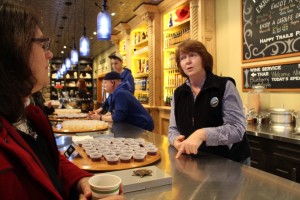How British Columbia And U.S. Regs Are Shaping Farm Markets [Opinion]

Opening a winery gives British Columbia farm markets more options to attract customers.
Laws passed decades ago to protect small farms in British Columbia aren’t keeping up with the realities of modern farming and their marketing efforts. Restrictions can shut down your ability to host weddings, but offer incentives to open wineries.
This issue was top-of-mind for many British Columbia hosts and attendees at throughout the 2016 NAFDMA Conference, which took place in and around Vancouver, British Columbia, the first week of February. On our first day of touring, a group from around the U.S. and Canada ate breakfast together. One woman from Kansas said her local zoning board didn’t see her as an agricultural business, even though she grew a large number of pumpkins and grapes on her farm. To her local board, she told us, only row crops were agricultural. She is in the midst of negotiating with them about how her farm and farm market should be classified.
I sat next to a Colorado tourism board rep on the bus that day. She said that the board has stepped in when state-level organizations want to see agritourism in Colorado expand but local zoning rules are blocking those types of operations. This kind of awkward advocacy is a natural outgrowth when old laws clash with modern reality. These laws had good intentions when they passed decades ago. They aimed to keep farms affordable, with regard to taxes, and to protect farmers from losing ground to developers in their area.
But farming has changed pretty dramatically over the past 30 to 40 years, in ways that favor large farms’ ability to automate many of the tasks. Most small to medium farms have turned to marketing to keep their farms intact. Add to that the huge popularity of locally produced food, and you have an industry that bears little resemblance to the types of farms lawmakers sought to protect in the 1960s and 1970s.
British Columbia laws have made this issue even more acute. Like many U.S. state laws, the legislature moved to ensure that farms would not be overtaken by developers. But the laws that were passed severely limit how farms with consumer-facing side businesses can operate.
Hosting farm weddings was a good way to make a good amount of money in a short time frame, and brides loved the idea of getting married in such attractive locations. But nearby businesses (rumored to be hotels, who were losing business to the farms) lodged complaints that these weddings violated farm-use laws. A series of crackdowns made headlines in late 2015. As a result, many brides were left scrambling for a backup location when farms cancelled the weddings on their property.
On our tour stop of Maan Farms Country Experience, we learned that before they opened a winery, they were allowed only 400 square feet for a farm market and could not host most of the agritourism attractions they wanted to have. When they opened a winery more than 10 years ago, the Mann family were delighted to learn their farm had a different set of regulations, ones that allowed more flexibility to attract consumers. By being a winery, they could multiply their sales floor space to around 3,000 square feet, and could add agritourism features. Without the winery, Maan Farms would not be as prosperous as it is today.
So what is the answer to this dilemma that is facing farmers in both the U.S. and Canada? The most common answer I heard was to get involved in politics and make sure the modern farmers’ voice is heard. Today’s laws are out of date and are not fulfilling their original purpose. The only way politicians and zoning boards will know that is if farmers tell them.









